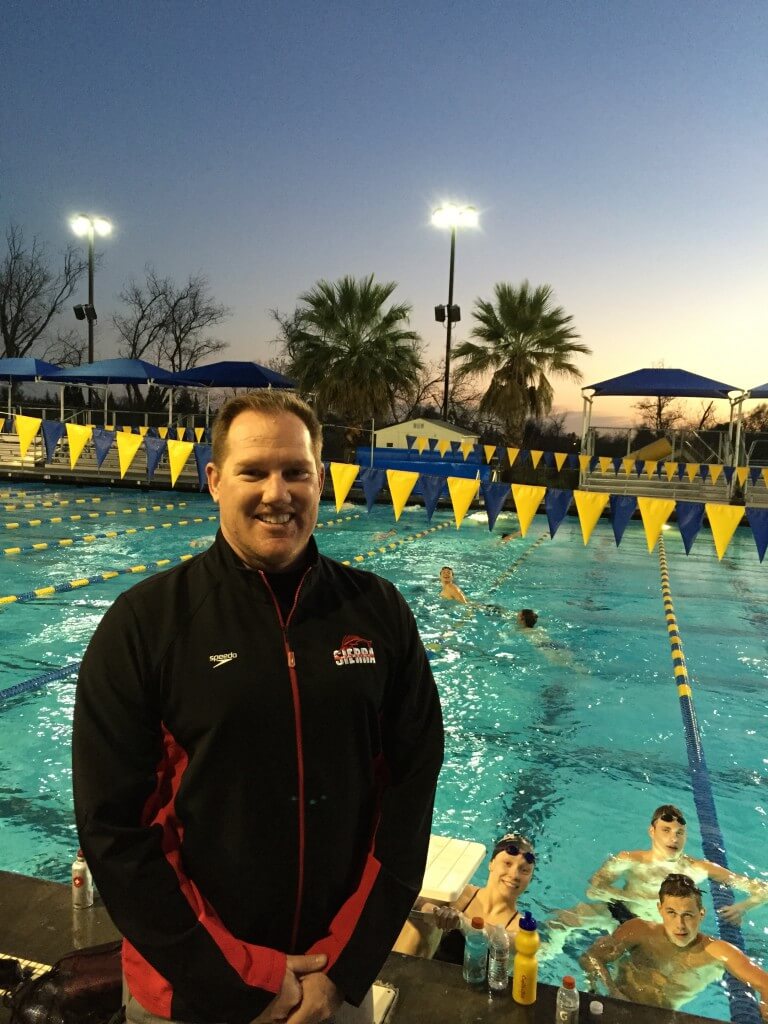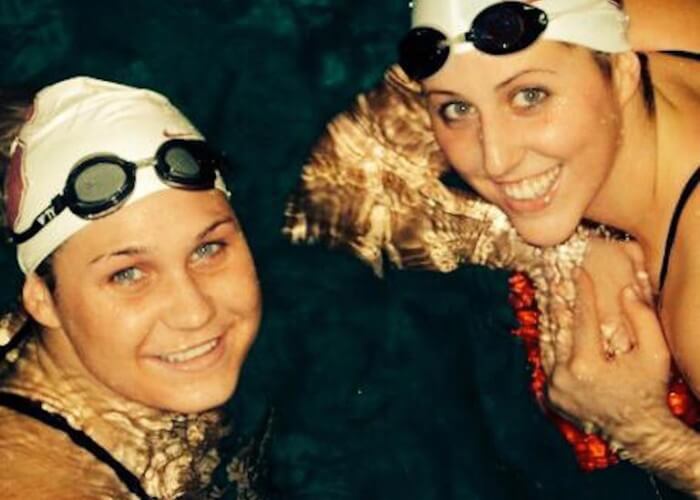Coach It Forward: Sierra Marlins Hit Jackpot with High-Character Scott Shea

By Annie Grevers, Swimming World Staff Writer
Scott Shea became head coach of the Sierra Marlins in October of 2014. He may be new to the Marlins, but he’s been a fixture on California swim decks for over twenty years.
Shea started a team at the Stanford recreation center (SCRA) with fellow coach Aimee Lehr in 1995. Ron and Don Heidary of Orinda Aquatics had just founded their club and were able to walk the newbies through the porcess.
“Shea modeled his club after Orinda,” Ron Heidary explained. “We had just gone through the growing pains.”
Heidary and his brother helped Shea and Lehr clear hurdles that inevitably arise when starting a club team.
Eventually SCRA became Palo Alto Stanford Aquatics (PASA-SCRA). Shea and Lehr grew the program from 20 swimmers to over 300. Two women’s national titles, 75 Junior National qualifiers, and three Junior National titles later, Shea found himself at the helm of one of the nation’s most successful programs.
REPUTED CHARACTER
Brian Bolster, last week’s Coach It Forward* subject, nominated Scott Shea for this week’s column. He called him a great friend and mentor in the sport. The two grew up in the profession together and continually call one another up to bounce ideas back and forth.
Bolster has the utmost respect for Shea. Turns out, a lot of coaches do.
“Scott is a high character man,” Heidary said. “He’s strong, disciplined, but also compassionate. He’s consistently produced top swimmers, but maintained humility.”
Shea’s coaching philosophy is simple: Admit when you’re wrong. When you don’t know the answer, look for it.
Coaches know this is easier said than done. But Shea has always been okay with saying, “I don’t know.”
“Teenagers are smart and can tell when you’re not being honest,” he said. Honesty is expected from those perceptive teens as well.
Brooke Bishop was coached by Shea in high school. She never lost a race in high school. I repeat. She never lost a race in high school.
“He kept us honest everyday in practice about achieving the goals we set at the beginning of the season,” Bishop said. “He makes swimming fun, and is really good about getting his swimmers excited for meets.”
His excitement for big meets is sincere, because he’s already envisioned his swimmers celebrating their victories.
Many coaches go to clinics on visualization and run their swimmers through mental exercises, but Shea feels you need to practice what you coach.
“Believe in an athlete, and actually see them doing it (succeeding) themselves,” Shea said.
A lot of coaches are fanatical about getting their athletes comfortable with envisioning success, but coaches need to “make sure their dialed in as well,” Shea said.
THE MOVE
After 19 seasons in one spot, Shea uprooted from his PASA family last summer.
Jeff Pearson, the former Sierra Marlins coach, and Shea had been long-time buddies. They went to college together and Shea said he had always had his feelers out for job openings with the Marlins.
“The position had interested me before, but I had not been in the right spot at the right time.”
Last summer, Shea was in the right spot at the right time.
“Anytime you leave a group you’ve helped create, it’s tough,” Shea said regarding his departure from PASA. His team was sad to see him go, but they were empathetic and happy for him as he embarked on a new adventure.
WHY COACHING?
“One of my swimmers went to a really good school. She struggled a bit after college, and she almost quit three months before Olympic Trials.”
That swimmer Shea referred to was the aforementioned Stanford standout Brooke Bishop. She won a national title in the 50 free in 2004 and was a member of the US national team in 2007 and 2008. I think Shea thought it may sound arrogant to mention his notable swimmer’s name. He’s humble indeed.
“I was disappointed in how NCAAs went my senior year,” Bishop said. “I was hoping my races there would be promising stepping stones on my way to trials in 2008. When they didn’t go as planned, I just stopped swimming.”
Shea persuaded Bishop to keep her head in the game. She had a legitimate chance to make the team in 2008 and Shea recognized the future regret she’d have if she did not give it a shot.
“I realized I wasn’t having fun in the pool, and he said he would make it fun if I wanted to train with him until trials,” Bishop said. “And fun it was! We worked hard, but also played dodgeball for dryland, participated in the Tour de’ PASA, and did two-person, run-around relays.”
Bishop did not qualify for the team, but finished fourth in the 100 fly and sixth in the 50 free. She and coach did not look at her performances as heartbreaks. She had stayed in the sport, given herself a fighting chance, and gifted her former club coach an extraordinary experience.
“There were ups and downs at trials, but it was amazing how far I’d come in three and a half months,” Bishop said. “It was the perfect end to my swimming career. I left the sport having fun with friends and an amazing coach.”
Recently, Shea attended Bishop’s wedding. There were seven of Shea’s former PASA swimmers in the wedding party. Watching the swimmers grow into friends, then adults who treat one another like family, that’s one of the most fulfilling parts of coaching, Shea said.
Shea has no kids of his own, but has been a sterling role model for hundreds of swimmers in his two decades of coaching. You can hear how full his heart is just by listening to him talk about his swim kin.
*Coach it Forward is a weekly column devoted to acquainting the swim world with some of the fantastic coaches in our great nation. The selection for the next featured coach is made by this week’s subject. The nomination process serves as a way for coaches to pat each other on the back and for the rest of us to learn the coaching philosophy and passions of each distinctly influential coach.





Wonderful, Scott. Good luck at SM.
We are so fortunate to have Scott Shea as our head coach at the Sierra Marlins. He does make the sport fun and brings an amazing energy to the pool deck.